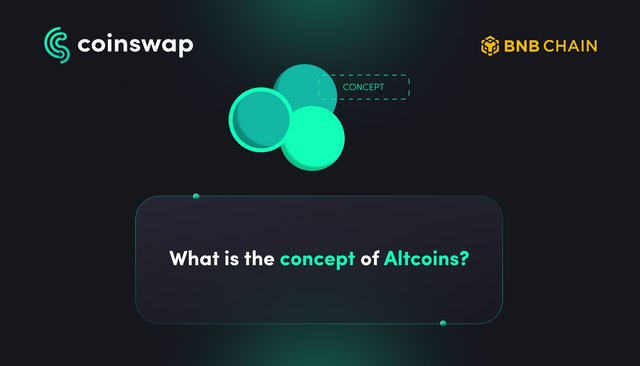
Altcoins, short for "alternative coins," are digital or virtual currencies that were created as an alternative to Bitcoin, the first and most well-known cryptocurrency. While Bitcoin paved the way for the cryptocurrency revolution, it also inspired the development of numerous other digital currencies, each with unique features and purposes. The concept of altcoins emerged to address specific Bitcoin shortcomings and offer diverse use cases in the rapidly evolving blockchain ecosystem. 😎💰
Altcoins are built on blockchain technology, a decentralized and immutable ledger that records all transactions and ensures the security and transparency of the network. While Bitcoin uses the Proof-of-Work (PoW) consensus mechanism to validate transactions and secure the network, many altcoins employ different consensus algorithms like Proof-of-Stake (PoS), Delegated Proof-of-Stake (DPoS), and Byzantine Fault Tolerance (BFT), among others. These alternative algorithms aim to improve scalability, energy efficiency, and transaction speeds. 🔄⚡
One of the primary motivations behind creating altcoins was to enhance privacy and anonymity in transactions. Bitcoin transactions are pseudo-anonymous, as all transaction details are recorded on the public blockchain, potentially exposing user identities. Altcoins like Monero, Zcash, and Dash introduced advanced privacy features, such as ring signatures, stealth addresses, and zero-knowledge proofs, to obfuscate transaction details and protect user privacy. 🕵️♂️🔒
Another significant aspect of altcoins is their focus on specific use cases beyond traditional currency. For instance, Ethereum, the second-largest cryptocurrency by market capitalization, introduced the concept of smart contracts. Smart contracts are self-executing contracts with predefined rules written into code. They allow for the creation of decentralized applications (DApps) and platforms, enabling a wide range of use cases, including decentralized finance (DeFi), non-fungible tokens (NFTs), and decentralized exchanges (DEXs). 💡📈
Stablecoins, a type of altcoin, are designed to maintain price stability by pegging their value to a reserve asset like the US Dollar or other commodities. These stablecoins offer stability and bridge the volatile world of cryptocurrencies and traditional financial systems. They have gained popularity as a means of transferring value and as a store of value in market volatility. 💱💼
Moreover, altcoins also aim to address scalability issues faced by Bitcoin. Bitcoin's limited block size and block time result in slower transaction speeds and higher fees during periods of high network activity. Altcoins like Litecoin and Bitcoin Cash were created with increased block sizes, allowing more transactions per block and faster confirmation times. 🚀📉
In recent years, the rise of altcoins has been fueled by the growing interest in blockchain technology and its potential applications. As more developers and entrepreneurs explore the possibilities of blockchain, they create new altcoins tailored to specific industries and use cases. Some altcoins target niche markets, like supply chain management, identity verification, and content monetization. 🌐📊
Despite the diversity and innovation within the altcoin space, investors and users should exercise caution due to the volatility and risks associated with the cryptocurrency market. Regulatory scrutiny, market sentiment, and technological developments can significantly impact the value and performance of altcoins. Therefore, conducting thorough research and understanding the fundamentals of each altcoin is crucial before investing or using them. 🔍💡
In conclusion, altcoins represent a diverse array of digital currencies that offer alternative solutions and functionalities compared to Bitcoin. From enhanced privacy and smart contract capabilities to niche industry applications, altcoins contribute to the expanding blockchain ecosystem. As the cryptocurrency market continues to evolve, altcoins will continue to play a pivotal role in shaping the future of finance and technology. 🌟💎